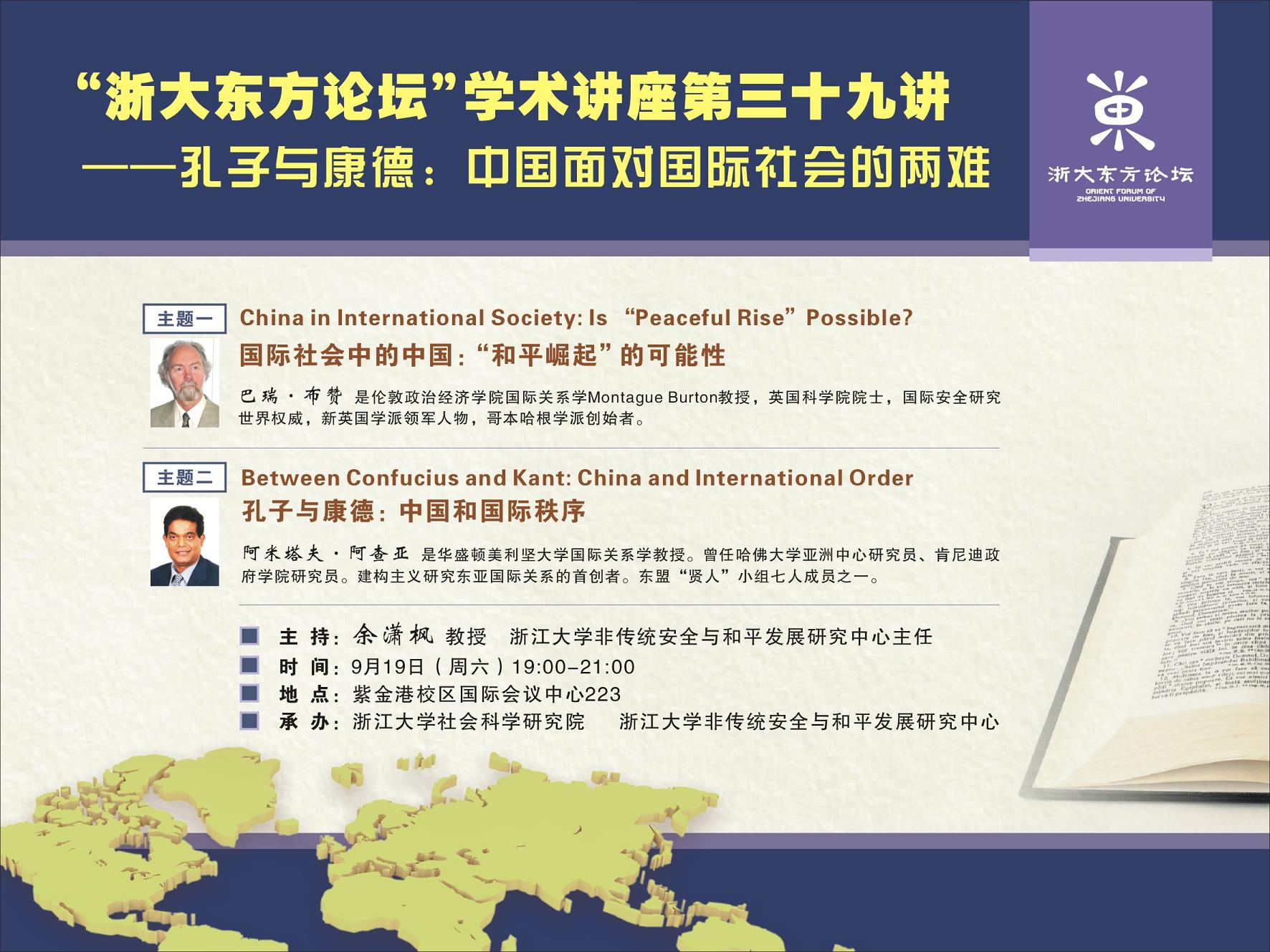浙大东方论坛第39讲:孔子与康德:中国面对国际社会的两难
发布时间:2009-09-15 浏览次数:6841
主题:China in International Society: Is “Peaceful Rise” Possible?
国际社会中的中国:“和平崛起”的可能性
主讲:Burry Buzan伦敦政治经济学院(LSE)国际关系学教授
主题:Between Confucius and Kant: China and International Order
孔子与康德:中国和国际秩序
主讲:Amitav Acharya 华盛顿美利坚大学国际关系学教授
主持:余潇枫教授 浙江大学非传统安全与和平发展研究中心主任
时间:9月19日(周六)19:00—21:00
地点:紫金港校区国际会议中心223
承办:浙江大学社会科学研究院
浙江大学非传统安全与和平发展研究中心
浙江大学非传统安全与和平发展研究中心

Burry Buzan教授简介:
巴瑞·布赞是伦敦政治经济学院国际关系学Montague Burton教授,哥本哈根和吉林大学荣誉教授。英国科学院院士。曾任英国国际问题研究协会副主席,北美国际问题研究协会副主席,《欧洲国际关系》主编。他已出版了20多本专著、合著或主编的著作,撰写或共同撰写超过100多篇文章或书本章节,在世界上20多个国家发表演讲、广播或提交了论文。除了理论研究之外,他还从事欧洲、南亚、南洲和东亚地区安全问题的公共政策辩论。目前的研究方向为:
1 )地区国际安全问题及概念;
2 )自史前史以来的国际制度的历史及发展
3 )国际关系理论,特别是结构现实主义;
4 )国际社会,以及英语学高校研究国际关系的方法。
AMITAV ACHARYA教授简介:
阿米塔夫·阿查亚是华盛顿美利坚大学国际关系学教授。曾任Bristol大学的全球治理学科的教授、管理与国际事务中心主任,新加坡南洋理工大学的教授、防御与策略研究中心副主任,多伦多约克大学政治科学教授,哈佛大学亚洲中心研究员、肯尼迪政府学院研究员。
阿查亚教授已出版了20余本著作,包括:《东南亚的新区域秩序》、《在东南亚构建安全共同体》、《亚太安全合作》、《合作手段:相对政治中的区域国际制度》、《恐慌的时代:恐怖战争中的权力VS原则》,《亚洲崛起:谁在领导?》等,在《国际组织》、《国际安全》、《世界政治》、《和平研究杂志》、《和平事务》及《华盛顿季刊》等期刊上发表了200余篇论文及评论。此外,还经常在CNN国际频道、BBC世界服务频道、CNBC和新加坡亚洲新闻频道等国际媒体上发表评论。
报告摘要:
China in International Society: Is “Peaceful Rise” Possible?’
国际社会中的中国:“和平崛起”的可能性
Barry Buzan
Abstract
During the last two centuries, China’s relationship with international society has gone through several phases. Since the shift of policy away from revolutionism in the late 1970s, China has moved closer to international society. Its current strategy of ‘peaceful rise/development’ has had considerable success on both the regional and global levels, and China wants to continue this process of accommodation while at the same time retaining its cultural and political distinctiveness. Yet much in the present condition of international society, including the fact of China’s new power, suggests that the policies that have worked for China over the past thirty years will not work for the next thirty. To make peaceful rise work, China needs to think hard about what kind of international society it wants to promote, especially what balance it wants between the regional and the global levels. Whatever course it chooses, its relationship with Japan will be a crucial factor in the success or not of peaceful rise, and China needs to take the lead in improving this troubled relationship. The continuation of peaceful rise is possible, but it will not be easy.
Between Confucius and Kant: China and International Order
孔子与康德的:中国和国际秩序
Amitav Acharya
Abstract
Some Chinese leaders have suggested that as a rising power, China must embrace neo-Confucian values, such as communitarianism rather than liberal democracy. The Chinese government has in the past spoken in favour of a "society over the self" approach to freedom, and recently set up Confucius Institutes as part of its new cultural diplomacy. Some Chinese and Western analysts suggest that the rise of China might mean the revival of an East Asian hierarchical order (hierarchy being a Confucian value) built around a benign Chinese hegemony. Might this mean China will develop its distinctive approach to regional and international order by rejecting he Kantian values in international relations such as liberal democracy and multilateralism in favour of a communitarian neo-Tributary system? Will it even turn economic interdependence, another Kantian value that it clearly embraces, into an instrument of its own dominance over weaker neighbours? The answer to this question is not yet clear, but I argue that such a development will leave China isolated and out of tune with global and regional developments, where democracy and multilateralism are increasingly challenging, if not supplanting, economic nationalism, security bilateralism and political authoritarianism. The challenge for China is to find a creative synthesis between Confucius and Kant; it cannot go in the either extreme.
附件1: 海报
【关闭】


